
Offsite Project of the Year
This category focuses on the planning and use of offsite construction methods, such as design, manufacturing, and assembly, for projects with offsite components like volumetric modules, panel systems, bathroom pods, MEP modules, and complex precast elements. Key criteria included improvements in time, efficiency, safety, quality, waste or greenhouse gas management, and cost. Contractors, consultants, developers, and project owners could enter.
Amaala Staff Village – Zone 5 Residential Building
Group AMANA
This offsite construction project involved the production of 1,566 modular boxes, each requiring individual casting of panels, assembly, and completion of all finishing and MEP works. With an average size of 4x10 meters and weighing approximately 85 tons, these modules were manufactured with precision in a controlled factory environment, ensuring superior quality and efficiency.
The process, meticulously managed to guarantee smooth coordination and a seamless supply chain, contributed to significant project success. Key accomplishments include:
- Minimising environmental impact through sustainable practices.
- Shortened build times, delivering faster results without compromising quality.
- Superior quality in every module, crafted in a factory setting for optimal conditions.
- Enhanced project efficiency, reducing time and resource consumption.
- Ideal for remote locations, where traditional construction would be challenging.
- Program and cost certainty, ensuring on-time and within-budget delivery.
- Minimal site disturbance, limiting disruption during on-site work.
By leveraging offsite construction, this project achieved remarkable results, meeting both technical and environmental goals while maintaining the highest standards of quality.
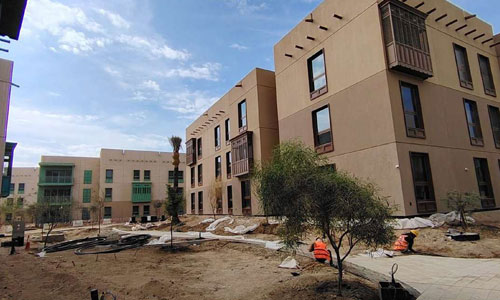
The Crest
Sobha Constructions
The Crest is an offsite construction project located at Sobha Hartland, in Dubai, covering a massive built-up area of 2.5 million sq. ft. The project consists of four interconnected towers, Tower A (49 floors), Tower B (41 floors), Tower C (36 floors), and Tower D (10 floors). Offsite construction was a cornerstone in ensuring the project’s efficient completion, reducing reliance on skilled labour, and delivering superior quality finishes.
New technology incorporated:
- Prefabricated Bathroom Pods: Manufactured offsite at Sobha’s dedicated factory, these bathroom pods were a key feature in reducing onsite labour and expediting installation.
- MEP Offsite Systems: These systems were prefabricated offsite, significantly reducing the onsite installation time and minimising clashes between various trades.
- Gypsum Pre-Fabrication: Ensured drywall installations were done efficiently, speeding up the overall interior construction phase.
- Tile Pre-cut & Kitting Services: Utilised pre-cut tiles to streamline flooring installation and minimise construction waste, contributing to higher resource efficiency and quality control.
- Supply Chain Strategy: To ensure seamless flow, bathroom pods were pre-assembled in Ras Al Khaimah, UAE before being transported to the site for installation.
This systematic approach ensured the components were delivered just-in-time, further minimising delays and costs associated with transportation and storage.
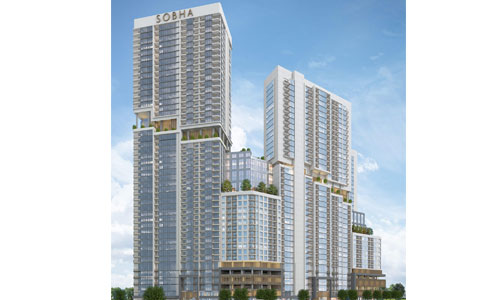
KFCA Procedures Area Upgrade
Shade Corporation
Shade Corporation is an Engineering Procurement & Construction (EPC) firm headquartered in Saudi Arabia's Eastern Province, with a presence across the GCC. Founded in 1992 as a general contracting company, Shade has evolved into an industry leader committed to “Building a Stronger Future”.
Harnessing advanced technologies—including Building Information Modelling (BIM), Virtual Design and Construction (VDC), Enterprise Resource Planning (ERP), and Artificial Intelligence (AI) - the company leverages proprietary software and mobile applications to streamline workflows and enhance operational efficiency. Its digital transformation initiatives have earned multiple awards, affirming its innovative engineering approach.
Shade’s portfolio features diverse modular and offsite fabricated projects designed to mitigate on-site risks and optimise efficiency. Through advanced process engineering and sustainable practices, the company reduces its carbon footprint by optimising resource utilisation and implementing targeted solutions to conventional construction challenges. Moreover, Shade’s transparent, open-book strategy fosters robust client collaboration, yielding significant time and cost efficiencies while reinforcing long-term, trust-based relationships.
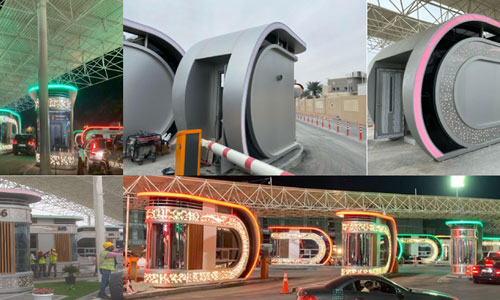
Pod Design & Manufacturing
Sobha Realty
PNC Architects, part of Sobha Realty, leads the design and development of bathroom pods using advanced offsite manufacturing. The pod initiative is integrated into high-end projects such as Sobha Hartland 1 & 2 and Sobha One.
Manufactured entirely offsite by Sobha Modular, these pods are essential to various towers. PNC Architects oversees their design and production, ensuring top-tier quality. Sobha Modular’s factory features LGS roll-forming machines, robotic welding, and automated board-cutting robots, ensuring precision and consistency.
The project involves over 34,000 pods, with 15,000 produced and 24,000 in different design stages. Offsite manufacturing reduces construction time, minimises on-site labour, and enhances quality control. The first project using bathroom pods was completed months ahead of schedule.
Digital integration enhances efficiency. Revit enables 3D modelling, Framecad’s Revlink automates CNC file generation, and Autodesk Inventor optimises fabrication drawings. These tools streamline workflows and supply chain coordination. Key benefits include faster construction, improved precision, and minimal on-site disruption.
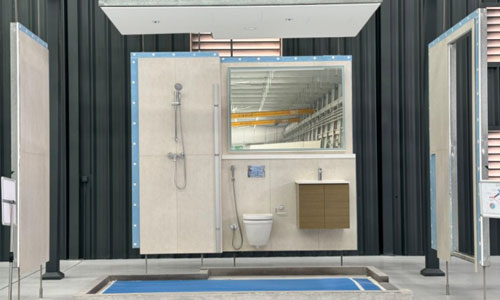
Safwa Ras Tanura Marine Bridge
Shade Corporation
Shade Corporation is an Engineering Procurement & Construction (EPC) firm headquartered in Saudi Arabia's Eastern Province, with a presence across the GCC. Founded in 1992 as a general contracting company, Shade has evolved into an industry leader committed to “Building a Stronger Future”.
Harnessing advanced technologies—including Building Information Modelling (BIM), Virtual Design and Construction (VDC), Enterprise Resource Planning (ERP), and Artificial Intelligence (AI) - the company leverages proprietary software and mobile applications to streamline workflows and enhance operational efficiency. Its digital transformation initiatives have earned multiple awards, affirming its innovative engineering approach.
Shade’s portfolio features diverse modular and offsite fabricated projects designed to mitigate on-site risks and optimise efficiency. Through advanced process engineering and sustainable practices, the company reduces its carbon footprint by optimising resource utilisation and implementing targeted solutions to conventional construction challenges. Moreover, Shade’s transparent, open-book strategy fosters robust client collaboration, yielding significant time and cost efficiencies while reinforcing long-term, trust-based relationships.
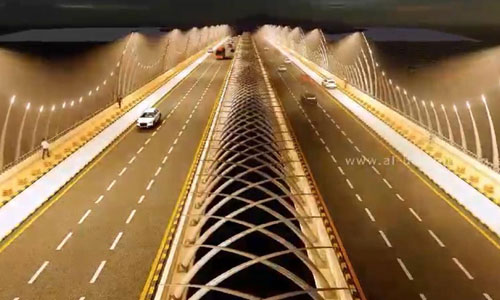
Sindalah Island
BEC Arabia
At BEC Arabia, we take pride in our proven expertise in modular and offsite construction, which has become a cornerstone of our ability to deliver efficient, high-quality, and sustainable projects.
In Sindalah Island project, we leveraged offsite construction methods to boost efficiency, reduce on-site labour, and minimise delays. Prefabricated components like steel structures and cladding facilitated rapid installation, while offsite joinery production ensured precision and sustainability. Just-in-time logistics minimised site congestion and storage needs. Sustainability was prioritised through waste reduction and improved resource use, with controlled environments enhancing quality control and reducing errors.
Despite challenges such as transportation constraints and minor on-site adjustments, mitigation strategies ensured smooth execution. Overall, offsite construction methods led to faster completion, improved quality, and maintained cost and sustainability control, resulting in a successful delivery.

Just Say Hi there!